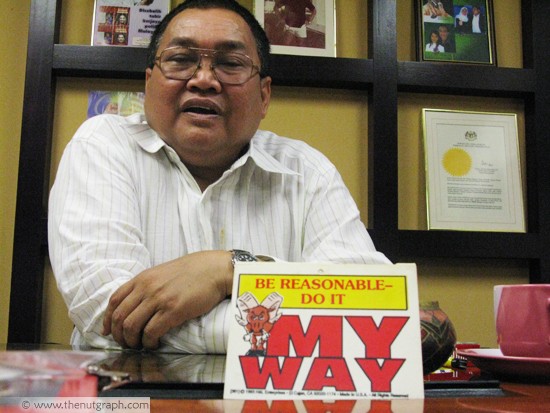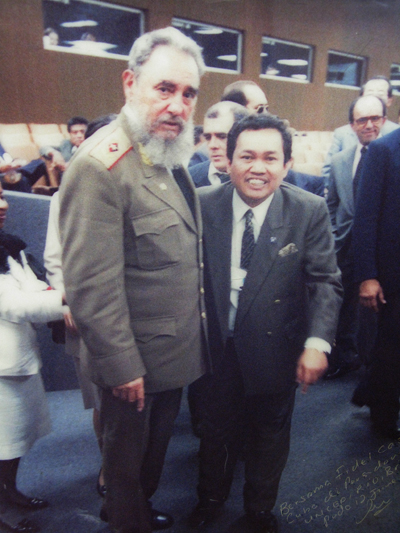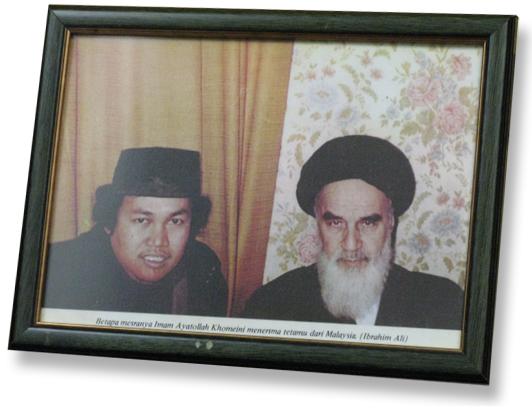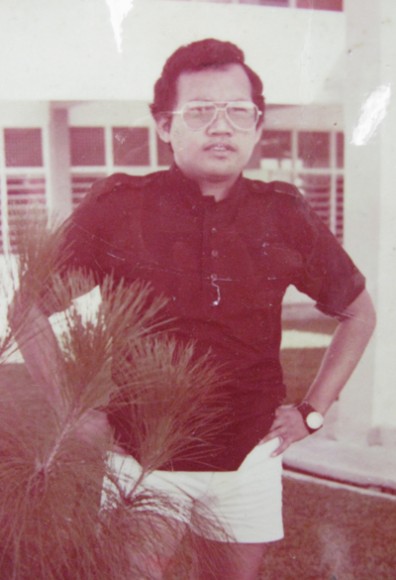WHATEVER you may think about him, Perkasa president Datuk Ibrahim Ali is found in Malaysia, too. The Nut Graph gets a glimpse into what shaped this combative right-wing politician during an interview in his Kuala Lumpur office on 10 Aug 2010.
Ibrahim, who is also independent Member of Parliament for Pasir Mas, talks about the childhood poverty that fuelled his years as a student activist and then as a politician.

TNG: When and where you born, and what was your childhood like?
Ibrahim Ali: I was born on 25 Jan 1951 in Kampung Pasir Pekan in Tumpat, Kelantan. I am the fifth child and eldest boy of 13 children. Because I was the first boy, my father pampered me a lot. But nothing luxurious. We were a poor family, and one of the things I did as a child was to plant watermelons to supplement the family income.
Our house was near a river which had a small island in the middle of it. I planted watermelons there. Now the area has been reclaimed and there’s a Tesco hypermarket there.
My childhood friends who were non-Malay [Malaysians] included a lot of Siamese kids because there was a Siamese community in my area. We did a lot of fishing and also meluba ikan, where you use a pail to catch fish by scooping them out of the water. We also went on picnics. There weren’t many Chinese; in school I had five or six Chinese friends.
Tell us about your ancestry and what your parents were like.
My ancestry on both sides is pure Kelantanese, but we might also have had some relations with Thailand. As you know, Pattani, Songkhla, and Narathiwat were historically owned by Kelantan before they were given to the Thais after a war.
My father was the village head. He was uneducated, but known as a brave and influential man. As village head, he was in charge of security and had to handle a lot of crime as we were near the Thai border. He received a small salary but it wasn’t enough for our large family.
My father would take me with him everywhere he went for his village-head duties. We would ride on his motorbike, and we would go out so often and for so long that sometimes he would quarrel with my mother over this. And because I was the village head’s son, sometimes there were people who made sure I didn’t have to walk – if I was going somewhere, there would be people who took turns to carry me on their shoulders all the way until I arrived.
When I was older and doing Form Six, my father was arrested under the Public Order (Preservation) Act 1958 for being a strong PAS supporter. The late Tunku Abdul Rahman also offered him a post in Umno Youth, which he rejected.
As for my mother, she was very pious. She was the one who taught us about Islam and to be committed to it.

What aspects of your childhood do you think have shaped you into the person you are today?
Observing my father as a village head. The culture of helping other people is what motivated me into student activism in my college years, and later, into politics. Being poor and facing hardship also made me rebellious.
I did not like the fact that I had to travel for so long to get to school, and when I arrived there, I saw the children of wealthy families being dropped off in cars or in paid trishaws. I had to first walk 15 minutes from my house to the river, then take a boat for 45 minutes to an hour, and then walk another half an hour to school.
I also would not get new school clothes or shoes for a long time. I had only one school shirt which was washed and hung to dry after school to wear again the next day. One pair of school shoes had to last three years before I got new ones.
To earn some money, I would sometimes bring two or three of my watermelons to school – as many as I could carry – borrow a knife from the canteen to cut them up, and sell them to my friends for a few sen a slice.
I also helped my father with the cultural shows he organised. He would erect a fence made of coconut leaves in our kampung, call in a wayang kulit troupe, and I would be the one collecting money for the show. Twenty sen per entry. He also organised Thai boxing and dikir barat shows, and sometimes our family would be able to make a small profit.
In primary school, I was class monitor from Standard One onwards. I also studied in different primary schools. First it was Sekolah Kebangsaan Padang Mandul, then Sekolah Kebangsaan Pasir Pekan, and then an English primary school in Tanah Merah, which was in another district. I moved because my parents couldn’t provide for such a big family, so I was sent to live with my uncle. I spent my secondary school years in Sekolah Kebangsaan Islah.
I did Lower and Upper Six in Maktab Abadi, a private school, where I couldn’t afford the fees, but they allowed me to work part-time while studying. They also allowed me to live underneath the school – it was a building on stilts, so I used plywood to make a kandang structure and I lived there. After Form Six, I signed up to do a Bachelor of Laws (LLB) in Institut Teknologi Mara (ITM), although later I switched my course to Mass Communications instead.
You mentioned being a student activist. What were your experiences?
I came to Kuala Lumpur by train to go to ITM with just RM10 in my pocket. I had no idea where ITM was. Luckily, when I walked over to Masjid Negara from the train station, I saw an ITM bus. There was some programme going on at the mosque. So I tumpang the bus back to the Shah Alam campus. It was in ITM that I became involved in student activism.
I was close to (Datuk Seri) Anwar (Ibrahim) during this time. I first met him while I was in Form Six when he came to my college to speak. He was already a student in Universiti Malaya (UM) then, and he was president of the National Union of Malaysian Muslim Students (PKPIM). At that time in college, I was president of the Muslim Students’ Association of Kelantan. That’s how our paths crossed. I met Anwar again in ITM during orientation.

After my first semester in ITM, I became secretary-general of Kesatuan Siswa ITM. Later I became its president. I was also elected deputy president of two student groups: PKPIM and the National Union of Malaysian Students. This was in 1972, the time of many student demonstrations. We demonstrated over all sorts of things – the situation in our colleges, against the Universities and University Colleges Act 1971, and for ITM to be made a university.
On 22 April 1974, we organised 6,000 ITM students to do a protest march from Shah Alam to Parliament. Over 1,000 were arrested, and quite a number injured and hospitalised. It was crazy! ITM closed for a month.
Things cooled for a while, but in December 1974, we demonstrated again over mass poverty in Baling (in Kedah). The price of rubber had dropped and the farmers there were facing starvation. There was one family who was so poor, all they had to eat was some kind of ubi, which turned out to be poisonous, and they died. It happened that at the time, the National Union of Malaysian Students had a project called “Desa Siswa” in Baling, so we were there when the incident happened. We organised a demonstration there of 10,000 people.
After coming back to KL, we continued protesting at Dataran Merdeka, asking the government to raise rubber prices. It was a two-day demonstration. Anwar joined on the third day, when the protest had moved to the national mosque.
That day, police started arresting people. I was arrested together with Anwar and put in the red police truck. But it was so packed inside that the door wouldn’t hold – it opened and I was right by the door. Everybody inside jumped out and escaped. Anwar and I ran and hid in a temple along Jalan Bandar. He was affected by the tear gas. I found him a taxi and sent him home, while I went back to Dataran Merdeka to see what was happening. Police were arresting more students. Later, I heard that Anwar was also arrested. I went to Port Klang for a few days to lie low.
I was arrested when I decided to go back to the Union House near Universiti Kebangsaan Malaysia to get some belongings. I rode a motorbike there, and it looked like everything was fine. In the Union House were seven or eight people who appeared to be sleeping. I thought they were students. But no, they were Special Branch! They were waiting for me. So 11 of us were arrested under the Internal Security Act. Nine were released after 60 days.
I was first taken to the police station near Odeon Cinema, and then transferred to the police station on Jalan Bandar. Anwar was already here. I faced intensive interrogation, almost 20 hours a day. After 60 days, two top-ranking officers said to me, “We have charges against you – you are a threat to the country’s security.” If I remember correctly, there were 21 charges. And they said I could be freed if I signed a confession. They said the other detainees had already signed confessions. I asked them if Anwar had signed his, and they said no. I said, if Anwar didn’t sign it, then I won’t, either. That’s how I came to be in Kamunting for two years.

Why were you so enraptured with Anwar?
I was idealistic and Anwar was my idol. He was such a great orator and he had great commitment and passion. I went to Kamunting because of him! If not, I would have signed the confession paper.
In Kamunting, I stayed with Anwar in the same block, Block 8. We ate our meals together, talked, played badminton. I also completed the final year of my Mass Comm degree in Kamunting.
Anwar was released three months before me. When I came out, we were both invited by the Saudi Arabian government to attend the World Assembly of Muslim Youth. This was 1976. After the conference, I stayed back to travel all over the Middle East. After Pakistan, I came back to Malaysia. I was offered jobs, by (then Information Minister) Tun Ghazali Shafie to be an information attaché at the United Nations, and by (then Finance Minister) Tengku Razaleigh Hamzah at Petronas, but I turned these down. I wanted to open a private professional school for external courses. I borrowed money and started the Kuala Lumpur Polytechnic in 1978.
What or who is a Malaysian to you?
A Malaysian to me is a one who puts loyalty to the King first as he is the symbol of the nation, and then one who abides by our federal constitution. That’s all. That to me is a Malaysian.
What kind of future do you want for Malaysia?
I want to see Malaysia continue as a peaceful country where people of different races live happily. And there should be economic balance among the races. By that, I am talking about the 30% stake, which is the objective of the New Economic Policy. Once we achieve this, I’m fine. I might not even raise bumiputera issues anymore once we achieve this. I accept everyone as Malaysian.
But the majority of those who are backward are still Malay [Malaysian]. All I want is to see the 30% objective met. ![]()
Related posts: Keeping Perkasa on track
The book Found in Malaysia, featuring 50 of our best interviews plus four previously unpublished ones with Datuk Zaid Ibrahim, Tan Sri Rafidah Aziz, Datin Paduka Marina Mahathir and Ramli Ibrahim, is now available at all good bookstores for RM45.
The Nut Graph needs your support


neptunian says
Ibrahim Ali is just a diehard opportunist who will stoop as low as possible to get what he wants. No principle to speak of – join UMNO to get a position, did not work out, go independent, flunk!, join PAS to get a positon, PAS too clean, no money in it, so pretend to be independent, but actually Mahathir lackey. Now go under Mahathir, who’s main agenda is to get Mukriz to be PM, whatever it takes. Ibrahim Ali is going for the ride since no one else would have him.
His political history does not speak of a man with any principle – talk is cheap – judge him for what he has done!
Kong Kek Kuat says
@ neptunian
You left out ABIM — at the very beginning.
Wayang Street says
So Brahim, your boss Mahathir has 90% of that 30%!
What did Castro and Khomeni say to you, other than a hello and a goodbye?
azmo says
Wow, you had non-Malay [Malaysians] as friends. What were they, slaves?
And you believe that a Malaysian is one that who is loyal to the King, yet you call people who want to treated with respect in their birth country as outsiders. How can anyone take Ibrahim Ali as a Malaysian? You should try selling this in your hometown and see what responses you get from your Siamese friends and also the non-Malays.
By the way, I thought Kelantan was always under Siamese rule. Hah, my history facts may have been wrong.
mnz says
Interesting, I wish you would follow-up on the interview:
1. What does he think is the best way to attain the 30% objective.
2. What does he think of the NEP or its variant; is there a better way?
3. What does he think of UMNO, DAP, PAS…
4. How to improve racial relations, etc.
Ida Bakar says
Interesting interview! I feel that I know this man a bit more and now understood where he came from. He is a product of his bitter experiences, no doubt about that. What is even more interesting is his inability to move on from that mindset. He is hankering after 30% bumi equity and yet cannot see that NEP as it is currently carried out have failed the very people it sought elevate economically.
Another hypocrisy of his is while he stood up against social injustice in his time as a student activist, he refuses to see that his organisation is perpetuating the same social injustice by denying the dissenting voices of fellow Malaysians.
I can only conclude that this is a man so scarred and so damaged by his experience that he cannot see the wood for the trees!
Elaine says
Hypocritical and outdated! He calls us “pendatang” but he himself says that he may be part Thai.
What 30%?!! The NEP has failed our nation.
Stop playing the racist card, I love my Malay, Indian and Chinese friends the same! We are MALAYSIANS!
Merah Silu says
It is a fact that you are the decendant of ‘pendatang’. What is wrong with that? Why are you complaining? He is partly Thai because Narathiwat, Yala and Pattani provinces are now in Thailand. These provinces were part of the Malay kingdom and were given by the British to the Thais as part of the deal with France/Thailand.
Has the NEP failed our nation? I do not think so. It is not as we expected it to be.
Is he racist? I do not think so. He is trying to protect and promote the interest of Malays as the bumiputera of this country.
Then is he an opportunist? Looking at his background, I tend to say yes.
Fabian says
Yeah, nothing wrong with trying to protect the interest of Malays. I mean, who wouldn’t love his own people? But to do that at the expense of non-Malays? Using it to justify discrimination in awarding scholarships and promotions? Opportunities in the civil service? Using thugs to intimidate others in a group and not have the confidence to debate with a lady?
“Bumiputera”? “Prince of the soil”? That in itself is a form of racism. No different from apartheid. Why the special “name” if it’s not a “class”? Why not just abolish poverty without involving race? If it was created “to reduce poverty among bumiputera”, why is it that there is opposition in removing the bumi discount for luxury houses? If you look at the statistics, it’s not about the “bumiputera” at all. It’s about the UMNOputera and BNputera. How else would the Temuan, Penan, Senoi and other BUMIRAJA be at this situation?
Yeah, he was born in a poor family, but so were many others. Nothing special about that. Most families WERE poor, from all races.
He spreads hate politics and fear politics. And he’s a racist.
megabigBLUR says
I don’t understand how someone who was a student activist, arrested and detained in Kamunting, and whose father was also arrested for political activities, can keep talking about censoring and locking up and shutting up others. It’s such a huge double standard.
He talks about the Constitution but apparently doesn’t even understand it properly himself…
JEFFREY NG says
He must have learned a lot from his wayang kulit days in his village. Guess he got mixed up along the way mixing with people like Mamakutty and decided that the best way to stay belly full is to play wayang kulit with the right company.
kl_sadguy says
What kind of future do you want for Malaysia?
I want to see Malaysia continue as a peaceful country where people of different races live happily. And there should be economic balance among the races. By that, I am talking about the 30% stake, which is the objective of the New Economic Policy. Once we achieve this, I’m fine. I might not even raise bumiputera issues anymore once we achieve this. I accept everyone as Malaysian.
But the majority of those who are backward are still Malay [Malaysian]. All I want is to see the 30% objective met.
Is that Ibrahim Ali????
kamal says
Thanks for the interview. As you said, his story is also another one that is made in Malaysia. And his experiences and interpretation of history and the ‘correct’ ethnic responsibility and relations are not peculiar; rather they may be more common than one realises, albeit expressed differently.
If we can take what he says at face value, why not move the dialogue from there? There are bridges that can be built between the opposing views. Are we ready to empathize with the bitterness and say let’s move on? In my opinion, it takes many a failed attempt, and many more attempts afterwards to get the different views to work together.
I feel that seeking and seeing the possibilities at any opportunity and being optimistic about forging common ground is important. Perhaps our experiences to date are all part of our growing pains – the challenges and tribulations of a maturing nation.